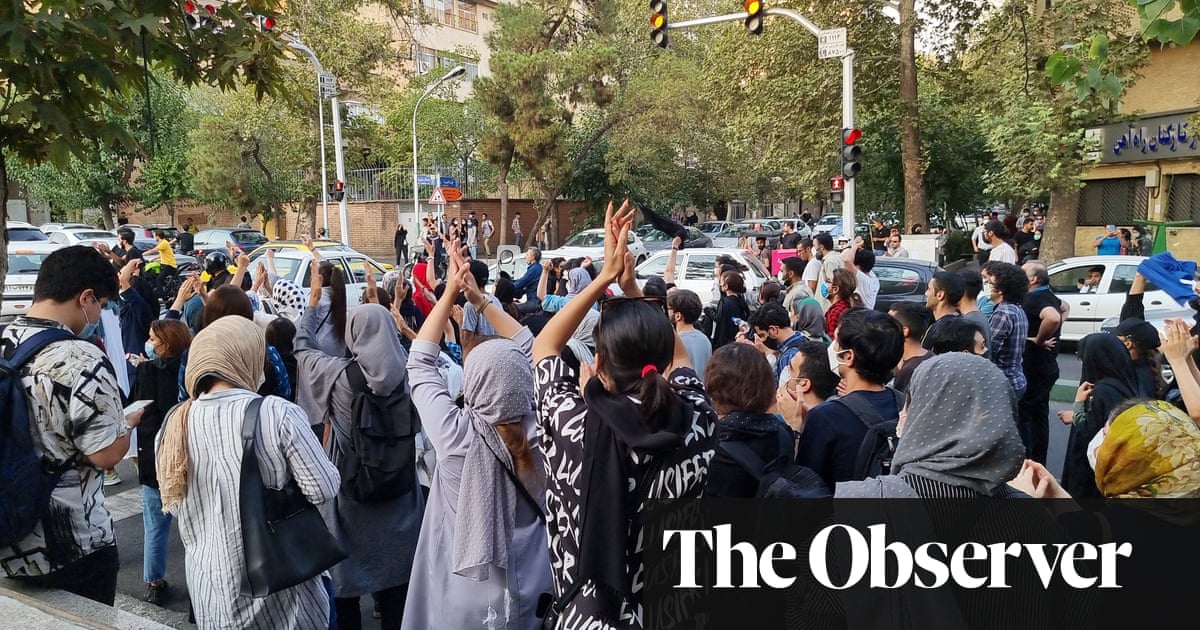
Show caption People in Tehran gather in protest against the death of Mahsa Amini who died after being arrested by Iran’s morality police. Photograph: Getty Images Opinion The Observer view on the backlash in Iran following the death of Mahsa Amini The pariah state’s regime is not invincible. If it doesn’t free its people, they will free themselves – sooner rather than later Observer editorial Sun 25 Sep 2022 06.15 BST Share on Facebook
Share on Twitter
Share via Email
The response of the Iranian regime to the death in police custody of a 22-year-old woman, Mahsa Amini, is dismayingly familiar. First, the authorities lied about what happened, claiming Amini died of natural causes despite eyewitness testimony that she was repeatedly beaten by officers. Then, as demonstrations spread across the country, they attempted a cover-up while denouncing the protesters as enemies of the Islamic revolution.
Now, facing unassuaged public fury and an increasingly politicised backlash, regime leaders have launched a violent crackdown, causing more deaths. Marchers at state-organised counter-demonstrations demand the execution of “offenders of the Qur’an” while Tehran’s misnomered intelligence ministry slanders protesters as seditionists opposed to religious values.
This grim sequence of events, while predictable, is both infuriating and distressing, primarily for Amini’s family, but also for all those in Iran seeking to build an open society where human rights, and women’s rights in particular, are respected. Similar protests in the past, such as the Girls of Revolution Street movement in 2018, produced not change but renewed repression.
It may be different this time. The bravery of young women in confronting the security forces and the so-called morality police (Gasht-e-Ershad or “guidance patrol”) is inspiring. They are supported by many young men and numerous others among an older population exhausted by severe economic hardship, official corruption and the illegitimacy of ruling politicians who stole the 2021 election.
The demonstrations represent a serious warning, possibly a last chance, for a morally bankrupt, despotic regime
The issue that led to Amini’s arrest – “inappropriate” wearing of the hijab – has huge symbolic significance. Compulsory use of the hijab was introduced by Ayatollah Ruhollah Khomeini’s followers after the 1979 revolution as a means of purging rivals. These days, it is used to exert social control and crudely keep women “in their place”.
Yet most Iranians reject the mandatory nature of religious regulations, saying hijab-wearing is a woman’s choice. An independent survey in 2020 found that 72% opposed compulsory hijab. Following Amini’s death, civil society organisations and celebrities have called for reform. Some religious leaders admit the law discredits Islam.
The demonstrations to date do not match in size the middle-class uprising, known as the Green Movement, that erupted after the disputed 2009 presidential election. Nor have they attained the level of lethality seen during 2019’s nationwide economic protests, when hundreds of people were killed. But they do represent a serious warning, possibly a last chance, for a morally bankrupt, despotic regime.
Iran’s president, Ebrahim Raisi, complained at the UN in New York last week about western double standards on human rights. They certainly exist, but that hardly justifies the horrific abuses over which he presides. Notorious examples include the atrocious treatment meted out to the women’s rights defender, Nasrin Sotoudeh, use of torture and hostage-taking affecting dual nationals.
Raisi must put his own house in order before the people rise up and do it for him. Just because internal upheavals often come to nothing does not mean the regime is invincible, as the Shah discovered. Ill health affecting Iran’s ultra-reactionary, 83-year-old supreme leader, Ayatollah Ali Khamenei, suggests change is coming. Now would be a good moment to rethink Iran’s future at home and in the world.
Iran appears caught in a time warp, fighting the battles of yesteryear. The US is no friend, but Joe Biden genuinely wants a nuclear deal. The Gulf Arabs are making peace with Israel. Rifts that defined the Middle East for generations are closing. Today’s challenges are global. Iran could shed its pariah status and become a great nation again – if only its people, and especially its cruelly oppressed women, were set free.
Do you have an opinion on the issues raised in this article? If you would like to submit a letter of up to 250 words to be considered for publication, email it to us at [email protected]








